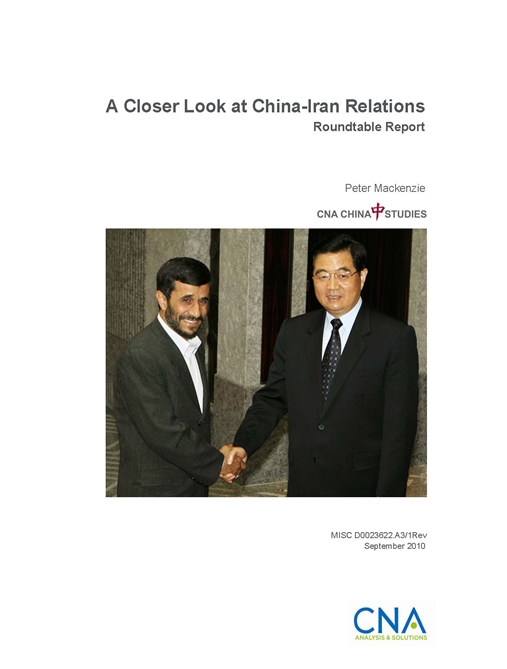On July 29, 2010, CNA China Studies hosted a half-day roundtable to discuss China’s relations with and activities in Iran (See Appendix for the roundtable itinerary). Participants, who included academics and analysts from think-tanks in Washington, were asked to address the following issues:
- the interests and actors involved in the China-Iran economic relationship;
- security issues in China-Iran relations;
- the larger context of China-Iran relations;
- and, the implications of this relationship for the U.S. and regional security.
This CNA report is based primarily on the presentations, findings, and discussions at the roundtable. It summarizes key themes heard at this event and does not represent a fully coordinated consensus of the roundtable participants. Points based on independent research are footnoted; points raised by participants or in the discussion are attributed to the roundtable in the text.
Key Themes
China has become the dominant external player in Iran’s economy. China is now Iran’s largest trade partner, its largest oil purchaser, and its largest foreign investor.
Iran holds great geostrategic significance for China. Iran is not only one of China’s largest oil providers, but also a key potential energy transport hub between the Middle East, Central Asia, and Europe. The relationship is asymmetrical, though: due largely to its economic isolation, Iran needs China more than China needs Iran.
China and Iran should be viewed not as “strategic partners,” but as “fair-weather business partners.” Their relationship is highly pragmatic, and although they now share many strategic interests, in the long run China’s need to maintain good relations with Western powers may affect China’s relationship with Iran.
Economic sanctions against Iran have driven the development of greater China-Iran economic ties. Having been cut off from the West by sanctions, Iran has engaged in a “Look East” economic strategy. China has been a major beneficiary.
China may be developing a new “Silk Road” strategy in which Iran plays an important role. Such a strategy would seek to build an integrated system to transport energy between Asia and the Middle East.
The United States should continue to closely observe the military dimensions of China-Iran relations. These include China’s support for Iran’s missile program and possible sales of dual-use technologies. This evolving security relationship will have important implications for the United States and its friends and allies.
The China-Iran relationship should be understood as part of a larger multilateral web of relationships spanning East Asia, South Asia, and the Persian Gulf. Iran has notable economic ties with other Asian countries such as Japan, and China’s relations with key countries like India, Israel, and Saudi Arabia may also affect China-Iran relations.
The China-Iran relationship could detract from China’s efforts to enhance its international image as a responsible player. The more isolated Iran becomes, the more danger exists that China will be seen as an outlier due to its ties with Iran.
U.S. coordination with China and other powers in the Persian Gulf will shape the China-Iran relationship. The panelists argued that the United States remains a critical and, in some ways, dominant actor in the region.
Download reportUnlimited distribution.
Details
- Pages: 26
- Document Number: MISC D0023622.A3/1Rev
- Publication Date: 9/10/2010
